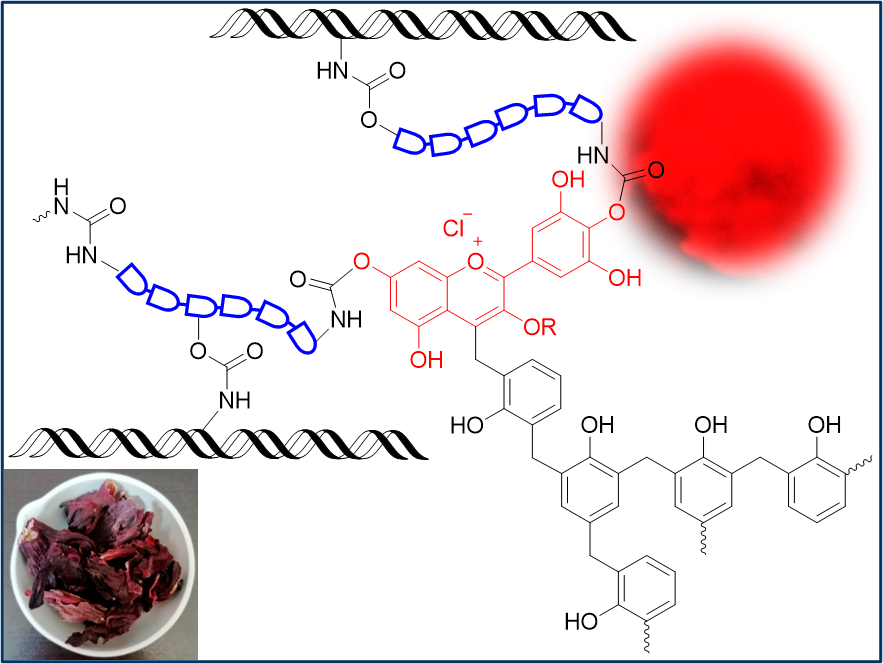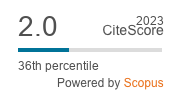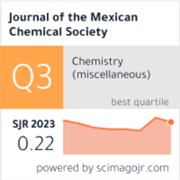Bioactive Interpenetrating Polymeric Networks: Incorporation of Hibiscus sabdariffa Polyphenols for Enhanced Biocompatibility and Mechanical Properties
DOI:
https://doi.org/10.29356/jmcs.v69i3.2331Keywords:
Biocompatible polymers, biobased polymers, biodegradable polymers, collagen, polyurethaneAbstract
Abstract. The synthesis and characterization of bioactive interpenetrating polymeric networks (IPNs) made from collagen, polyurethane, and polyphenols extracted from Hibiscus sabdariffa flowers are presented. Polyphenols were extracted via ultrasound-assisted methods and incorporated into IPNs to enhance their properties. The study explored various IPN compositions and assessed their physicochemical characteristics, including thermal stability, mechanical properties, swelling behavior, and degradation in different media. FTIR analysis confirmed the presence of phenolic and collagen components in the polymer networks. Thermogravimetric analysis indicated a decrease in thermal stability with higher polyphenol content, attributed to lower crosslinking density. Rheometry showed an increase in storage modulus with polyphenol incorporation, suggesting enhanced mechanical strength. Swelling studies demonstrated that polyphenol-enriched IPNs exhibit higher water absorption, especially in alkaline conditions. Biocompatibility tests, including MTT and hemolysis assays, revealed favorable interactions with human monocytes and porcine fibroblasts. The findings suggest that Hibiscus sabdariffa polyphenols can significantly improve the bioactivity and mechanical properties of IPNs, making them suitable for biomedical applications, particularly in wound healing and tissue engineering.
Resumen. Este trabajo presenta la síntesis y caracterización de redes poliméricas interpenetradas (IPN) bioactivas elaboradas a partir de colágeno, poliuretano y polifenoles extraídos de flores de Hibiscus sabdariffa. Los polifenoles se extrajeron en un proceso asistido por ultrasonido y se incorporaron a las IPNs para mejorar sus propiedades. El estudio exploró varias composiciones de IPNs y evaluó sus características fisicoquímicas, incluida la estabilidad térmica, las propiedades mecánicas, el comportamiento de hinchamiento y la degradación en diferentes medios. El análisis por FTIR confirmó la presencia de componentes fenólicos y de colágeno en las redes de polímeros. El análisis termogravimétrico indicó una disminución en la estabilidad térmica con un mayor contenido de polifenoles, atribuido a una menor densidad de reticulación. La reometría mostró un aumento en el módulo de almacenamiento con la incorporación de polifenoles, lo que sugiere una mayor resistencia mecánica. Los estudios de hinchamiento demostraron que las IPN enriquecidas con polifenoles exhiben una mayor absorción de agua, especialmente en condiciones alcalinas. Las pruebas de biocompatibilidad, incluidos MTT y ensayos de hemólisis, revelaron interacciones favorables con monocitos y eritrocitos humanos y fibroblastos porcinos. Los hallazgos sugieren que los polifenoles de Hibiscus sabdariffa pueden mejorar significativamente la bioactividad y las propiedades mecánicas de las IPN, haciéndolas adecuadas para aplicaciones biomédicas, particularmente en la curación de heridas y la ingeniería de tejidos.
Downloads
References
Hirano, K.; Asami, M. React. Funct. Polym. 2013, 73, 256–269. DOI: https://doi.org/10.1016/j.reactfunctpolym.2012.07.003.
Basafa, M.; Hawboldt, K. Biomass Convers. Biorefinery. 2021. DOI: https://doi.org/10.1007/s13399-021-01408-x.
Briou, B.; Caillol, S.; Robin, J. J.; Lapinte, V. Eur. J. Lipid Sci. Technol. 2018, 120, 1800175. DOI: https://doi.org/10.1002/ejlt.201800175
Khezri, R.; Alias, A. B.; Abdul Karim, W. A. W.; Motlagh, S. R. J. Phys. Conf. Ser. 2019, 1349, 012134. DOI: https://doi.org/10.1088/1742-6596/1349/1/012134.
Sarika, P. R.; Nancarrow, P.; Khansaheb, A.; Ibrahim, T. Polymers (Basel). 2020, 586, 119543. DOI: https://doi.org/10.3390/polym12102237.
Biziks, V.; Fleckenstein, M.; Mai, C.; Militz, H. Holzforschung. 2020, 74, 344–350. DOI: https://doi.org/10.1515/hf-2019-0061.
Hou, J.; Chen, X.; Sun, J.; Fang, Q. Polymer (Guildf). 2020, 200, 122570. DOI: https://doi.org/10.1016/j.polymer.2020.122570.
Yang, W.; Rallini, M.; Natali, M.; Kenny, J.; Ma, P.; Dong, W.; Torre, L.; Puglia, D. Mater. Des. 2019, 161, 55–63. DOI: https://doi.org/10.1016/j.matdes.2018.11.032.
Liu, J.; Dai, J.; Wang, S.; Peng, Y.; Cao, L.; Liu, X. Compos. Part B Eng. 2020, 190, 107926. DOI: https://doi.org/10.1016/j.compositesb.2020.107926.
Fang, L.; Tao, Y.; Zhou, J.; Wang, C.; Dai, M.; Sun, J.; Fang, Q. Polym. Chem. 2021, 12, 766–770. DOI: https://doi.org/10.1039/d0py01653e.
De Hoyos-Martínez, P. L.; Issaoui, H.; Herrera, R.; Labidi, J.; Charrier-El Bouhtoury, F. ACS Sustain. Chem. Eng. 2021, 9, 1729–1740. DOI: https://doi.org/10.1021/acssuschemeng.0c07505.
Hafiz, N. L. M.; Tahir, P. M. D.; Hua, L. S.; Abidin, Z. Z.; Sabaruddin, F. A.; Yunus, N. M.; Abdullah, U. H.; Abdul Khalil, H. P. S. J. Mater. Res. Technol. 2020, 9, 6994–7001. DOI: https://doi.org/10.1016/j.jmrt.2020.05.029.
Abbas, M.; Saeed, F.; Anjum, F. M.; Afzaal, M.; Tufail, T.; Bashir, M. S.; Ishtiaq, A.; Hussain, S.; Suleria, H. A. R. Int. J. Food Prop. 2017, 20, 1689–1699. DOI: https://doi.org/10.1080/10942912.2016.1220393.
Aslam, M. S.; Ahmad, M. S.; Riaz, H.; Raza, S. A.; Hussain, S.; Qureshi, O. S.; Maria, P.; Hamzah, Z.; Javed, O. Phytochemicals. 2018, 95–102. DOI: https://doi.org/http://dx.doi.org/10.5772/intechopen.79179. DOI: https://doi.org/10.5772/intechopen.79179
Carvalho, M. T. B.; Araújo-Filho, H. G.; Barreto, A. S.; Quintans-Júnior, L. J.; Quintans, J. S. S.; Barreto, R. S. S. Phytomedicine. 2021, 90, 153636. DOI: https://doi.org/10.1016/j.phymed.2021.153636.
Contardi, M.; Lenzuni, M.; Fiorentini, F.; Summa, M.; Bertorelli, R.; Suarato, G.; Athanassiou, A. Pharmaceutics 2021, 13, 999. DOI: https://doi.org/10.3390/pharmaceutics13070999.
Tsakiroglou, P.; Vandenakker, N. E.; Del Bo’, C.; Riso, P.; Klimis-Zacas, D. Nutrients. 2019, 11, 1075. DOI: https://doi.org/10.3390/nu11051075.
Riaz, G.; Chopra, R. Biomed. Pharmacother. 2018, 102, 575–586. DOI: https://doi.org/10.1016/j.biopha.2018.03.023.
Jabeur, I.; Pereira, E.; Caleja, C.; Calhelha, R. C.; Soković, M.; Catarino, L.; Barros, L.; Ferreira, I. C. F. R. Food Funct. 2019, 10, 2234–2243. DOI: https://doi.org/10.1039/c9fo00287a.
Chou, C. C.; Wang, C. P.; Chen, J. H.; Lin, H. H. Antioxidants. 2019, 8, 620. DOI: https://doi.org/10.3390/antiox8120620.
Ali, B. H.; Al Wabel, N.; Blunden, G. Phyther. Res. 2005, 19, 369–375. DOI: https://doi.org/10.1002/ptr.1628.
Cavalcante, J.; Oldal, D. G.; Peskov, M. V.; Beke, A. K.; Hardian, R.; Schwingenschlögl, U.; Szekely, G. ACS Nano 2024, 18, 7433–7443. DOI: https://doi.org/10.1021/acsnano.3c10827.
Dutta, S.; Gupta, R. Sen; Manna, K.; Islam, S. S.; Bose, S. Chem. Eng. J. 2023, 472, 145008. DOI: https://doi.org/10.1016/j.cej.2023.145008.
Zhao, D.; Kim, J. F.; Ignacz, G.; Pogany, P.; Lee, Y. M.; Szekely, G. ACS Nano. 2019, 13, 125–133. DOI: https://doi.org/10.1021/acsnano.8b04123.
Wancura, M.; Nkansah, A.; Chwatko, M.; Robinson, A.; Fairley, A.; Cosgriff-Hernandez, E. J. Mater. Chem. B. 2023, 11, 5416–5428. DOI: https://doi.org/10.1039/d2tb02825e.
Claudio-Rizo, J. A.; Carrillo-Cortés, S. L.; Becerra-Rodríguez, J. J.; Caldera-Villalobos, M.; Cabrera-Munguía, D. A.; Burciaga-Montemayor, N. G. J. Mater. Res. 2022, 37, 636–649. DOI: https://doi.org/10.1557/s43578-021-00476-z.
Claudio-Rizo, J. A.; Escobedo-Estrada, N.; Carrillo-Cortes, S. L.; Cabrera-Munguía, D. A.; Flores-Guía, T. E.; Becerra-Rodriguez, J. J. J. Mater. Sci. Mater. Med. 2021, 32. DOI: https://doi.org/10.1007/s10856-021-06544-4.
Zhang, W.; Qi, X.; Zhao, Y.; Liu, Y.; Xu, L.; Song, X.; Xiao, C.; Yuan, X.; Zhang, J.; Hou, M. Int. J. Pharm. 2020, 586, 119543. DOI: https://doi.org/10.1016/j.ijpharm.2020.119543.
Ragupathi Raja Kannan, R.; Arumugam, R.; Anantharaman, P. Curr. Bioact. Compd. 2011, 7, 118–125. DOI: https://doi.org/10.2174/157340711796011142.
Lee, M. Y.; Yoo, M. S.; Whang, Y. J.; Jin, Y. J.; Hong, M. H.; Pyo, Y. H. Korean J. Food Sci. Technol. 2012, 44, 540–544. DOI: https://doi.org/10.9721/KJFST.2012.44.5.540.
Márquez-Rodríguez, A. S.; Grajeda-Iglesias, C.; Sánchez-Bojorge, N. A.; Figueroa-Espinoza, M. C.; Rodríguez-Valdez, L. M.; Fuentes-Montero, M. E.; Salas, E. Molecules. 2018, 23, 1587. DOI: https://doi.org/10.3390/molecules23071587.
Guimarães, I.; Baptista-Silva, S.; Pintado, M.; Oliveira, A. L. Appl. Sci. 2021, 11, 1230. DOI: https://doi.org/10.3390/app11031230.
Chowdhury, A.; Nosoudi, N.; Karamched, S.; Parasaram, V.; Vyavahare, N. Polyphenol J. Dermatol. Sci. 2021, 102, 94–100. DOI: https://doi.org/10.1016/j.jdermsci.2021.03.002.
Cyboran, S.; Oszmiański, J.; Kleszczyńska, H. Cell. Mol. Biol. Lett. 2012, 17, 77–88. DOI: https://doi.org/10.2478/s11658-011-0038-4.
Krishna, P. G. A.; Sivakumar, T. R.; Jin, C.; Li, S. H.; Weng, Y. J.; Yin, J.; Jia, J.-Q.; Wang, C. Y.; Gui, Z. Z. Pharmacogn. Mag. 2018, 14, 103. DOI: https://doi.org/10.4103/pm.pm. DOI: https://doi.org/10.4103/pm.pm_491_16
Kaviarasan, S.; Vijayalakshmi, K.; Anuradha, C. V. Plant Foods Hum. Nutr. 2004, 59, 143–147. DOI: https://doi.org/10.1007/s11130-004-0025-2.
Lanping, M. A.; Zaiqun, L. I. U.; Bo, Z.; Li, Y.; Zhongli, L. I. U. Chinese Sci. Bull. 2000, 45, 2052–2056.
Kawaguchi, K.; Matsumoto, T.; Kumazawa, Y. Curr. Top. Med. Chem. 2011, 11, 1767–1779. DOI: https://doi.org/10.2174/156802611796235152.
Liu, L.; Wu, X.; Zhang, B.; Yang, W.; Li, D.; Dong, Y.; Yin, Y.; Chen, Q. Food Nutr. Res. 2017, 61, 1333390. DOI: https://doi.org/10.1080/16546628.2017.1333390.
Shakoor, H.; Feehan, J.; Apostolopoulos, V.; Platat, C.; Dhaheri, A. S. Al; Ali, H. I.; Ismail, L. C.; Bosevski, M.; Stojanovska, L. Nutrients 2021, 13, 728. DOI: https://doi.org/10.3390/nu13030728.
Rapala, K. Ann. Chir. Gynaecol. Suppl. 1996, 211, 1—53. DOI: https://doi.org/10.1016/S0020-7292(96)90138-1
Peranteau, W. H.; Zhang, L.; Muvarak, N.; Badillo, A. T.; Radu, A.; Zoltick, P. W.; Liechty, K. W. J. Invest. Dermatol. 2008, 128, 1852–1860. DOI: https://doi.org/10.1038/sj.jid.5701232.


Downloads
Published
Issue
Section
License
Copyright (c) 2025 Martín Caldera-Villalobos, Jesús Alejandro Claudio-Rizo

This work is licensed under a Creative Commons Attribution-NonCommercial 4.0 International License.
Authors who publish with this journal agree to the following terms:
- Authors retain copyright and grant the journal right of first publication with the work simultaneously licensed under a Creative Commons Attribution License that allows others to share the work with an acknowledgement of the work's authorship and initial publication in this journal.
- Authors are able to enter into separate, additional contractual arrangements for the non-exclusive distribution of the journal's published version of the work (e.g., post it to an institutional repository or publish it in a book), with an acknowledgement of its initial publication in this journal.









